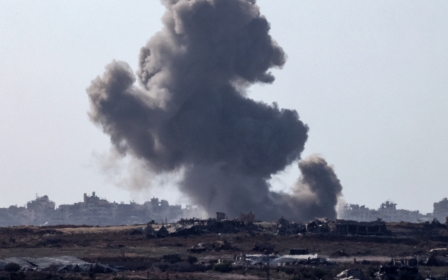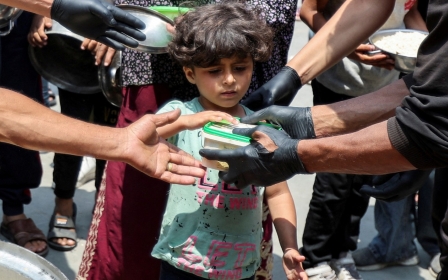Arab League will call for 'UN peacekeeping force' in Palestinian territories, reports say

The Arab League is set to call for a UN peacekeeping force to be deployed in occupied Palestinian territories until a two-state solution with Israel is achieved, according to media reports.
According to BBC Arabic and Saudi-funded Asharq Al-Awsat, the call will be made in the final statement of the Arab League summit being held in Bahrain on Thursday.
The regional body will highlight the need to establish a timeline for a political process that leads to a Palestinian state.
It will also urge full recognition of Palestine by the UN Security Council on the pre-1967 borders with East Jerusalem as its capital.
The call will come as the issue of “post-war governance” in Gaza, which assumes Hamas will no longer exist as a capable governing and military force, continues to be raised by international and Israeli officials.
Stay informed with MEE's newsletters
Sign up to get the latest alerts, insights and analysis, starting with Turkey Unpacked
The Financial Times reported on Wednesday that the US has been encouraging Arab states to take part in a Gaza multinational force to avoid having Israeli troops permanently stationed there.
Arab states have asked the US to lead the initiative, according to a western source, but Washington does not favour having American troops on the ground in Gaza.
Saudi Arabia was reportedly among other Arab states to reject the idea of deploying their forces in Gaza, fearing it would be seen as being complicit with Israel.
The United Arab Emirates (UAE) also ruled out last week taking part in Gaza’s governance after the war, saying it would not provide "cover" for Israel's actions in the enclave.
The strongly-worded statement came in response to Israeli Prime Minister Benjamin Netanyahu, who earlier said a civilian government in Gaza was needed with possible support of the UAE and others.
A US official on Wednesday told Middle East Eye that Bahrain, a close ally of Saudi Arabia, has signalled its willingness to be part of an Arab multinational force to administer security in Gaza after the war.
A senior western official familiar with the attempts to build the force told MEE that Manama could serve as "the tip of the spear" to provide momentum for a wider push for a multinational force.
"Bahrain is not the issue - Saudi Arabia and UAE are the clinchers," the official said.
Israeli and Hamas positions
On Wednesday, disagreements in the Israeli government over the issue of post-war plans in Gaza became public.
Israeli Defence Minister Yoav Gallant criticised the reluctance by Netanyahu's government to present a clear post-war plan.
He said he opposed open-ended Israeli military or civilian rule there, warning that the other alternative was the return of Hamas governance.
Israeli rule over Gaza would be a “negative and dangerous option for the State of Israel strategically, militarily, and from a security standpoint”, he said.
He called on Netanyahu to publicly rule out Israeli military or civil rule in the Strip, sparking backlash from the premier’s coalition partners.
The growing discussions on the political future of Gaza come while the Israeli military continues to pound and besiege the strip.
Israeli forces have killed more than 35,000 Palestinians and wounded nearly 80,000 in Gaza since the war started on 7 October, following the Hamas-led attack on Israel that left nearly 1,200 Israelis killed and 250 taken captive.
But more than seven months later, Israel has failed to achieve its declared goals of dismantling Hamas’ military and governance capabilities, or returning the captives.
Troops and tanks were sent into northern Gaza last week but faced stiff resistance from Hamas, leaving at least 10 soldiers killed in six days.
Israel had claimed in January that Hamas’ battalions in the north had been dismantled.
Hamas and other Palestinian factions previously rejected the presence of any foreign forces in Gaza after the war, saying that governance of the strip was an internal Palestinian matter.
On Wednesday, Hamas chief Ismail Haniyeh downplayed any post-war plans that exclude the Palestinian movement, saying “Hamas was here to stay”.
He added that the post-war administration of the Gaza Strip will be decided by Hamas in consultation with other Palestinian parties.
Middle East Eye delivers independent and unrivalled coverage and analysis of the Middle East, North Africa and beyond. To learn more about republishing this content and the associated fees, please fill out this form. More about MEE can be found here.






